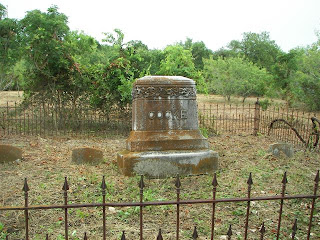Here’s the lineage:
Margaret Ellen Cocke (1848 - 1890) - Daughter of Frederick Bird Smith
Cornelia Vaughn (1870 - ) - Daughter of Margaret Ellen
Aubrey Vaughn Stimson (1900 - 1983) - Son of Cornelia
Frederick Bird Smith Cooke was a Confederate officer, Texas Congressman, member of the Secession Convention, and delegate to the 1875 Texas Constitutional Convention. He is listed as a significant Texan by the Texas State Historical Association. Yet today he rests in a forgotten grave near Buda TX
 |
| John Alexander Cocke |
One contemporary said of him:
"While F.B.S seemed almost a moron in business, a University psychologist pronounced him 'the greatest example of a photographic brain of which I ever heard.' He memorized many whole books, all of Shakespeare's plays, and endless articles verbatim and repeated all of them well past his eightieth birthday. There are story after story from his grandchildren in their letters telling of this remarkable feat. It just absolutely has to be true. When asked how he did it, he said that from his earliest childhood, if assigned something to memorize, if he didn't like it, he could study for weeks and not retain it. However, if he liked it, all he had to do was read it once more and it was his forever."
- from Hill Cocke's study of Naomi Greens Cones notes:On October 2, 1832 Frederick married nineteen-year-old Eliza Malvina Rogers in
But by 1854 they were both 41-years-old and ready for a change. They sold their large farm for $15,000 and set out to explore the southwest.
His grandson William later recalled:
“On the trip, according to family legend, he met up with a like-minded fellow Mason who was also land-hungry. The story goes, that he opened his money belt and loaned his wandering friend a thousand dollars. Whether or not the money was ever repaid is not clear … The moving clan required the use of two mule-drawn wagons and a large handsome hack in which our grandmother rode in style with the young members of her numerous brood.”
 |
| Helena, Texas (late 1800s) |
The Cockes, with their six sons and five daughters in tow, wintered in
 |
| FBS Cocke - Legislature Index |
When the Civil War broke out, Frederick Bird Smith Cocke joined the “Helena Guards” of
But
Frederick Bird Smith Cocke died on April 28, 1903 in Center Point TX Cocke Family Cemetery
Long after his death Frederick’s grandson recalled how his grandfather loved reciting poetry to him from memory, especially long passages from Sir Walter Scott and from Pollock’s “In the Course of Time.”
Yet haply not rewardless we shall trace
The dark disastrous years of finished Time:
Sorrows remembered sweeten present joy.
Nor yet shall all be sad; for God gave peace,
Much peace, on earth, to all who feared his name
The dark disastrous years of finished Time:
Sorrows remembered sweeten present joy.
Nor yet shall all be sad; for God gave peace,
Much peace, on earth, to all who feared his name
-Excerpt from Pollock’s “In the Course of Time”
Interesting Links:West Kerr Current - William A. Cocke Recollections



Thank you for posting the photos and info! I'd never seen a photo of Margaret Ellen. Her sister - Sarah "Sallie" Amelia - was my ancestor. Terri
ReplyDelete